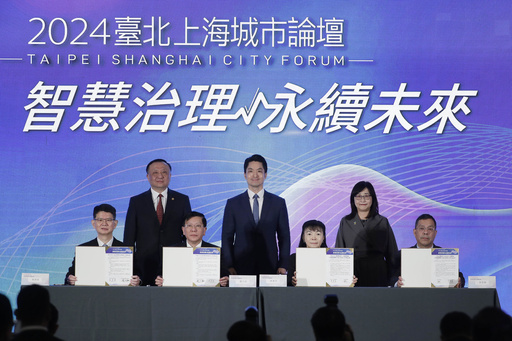TAIPEI, Taiwan — The mayor of Taipei, who has a pro-China stance, expressed a desire for reduced tensions between Taiwan and China during his address at the 15th Taipei-Shanghai Twin-City Forum held on Tuesday. His remarks came despite China’s ongoing military provocations against the self-governing island.
Chiang Wan-an highlighted the importance of fostering peace and collaboration, stating, “As the elected mayor of Taipei, I hold high hopes for the stability and development across the strait. We should see more lights illuminating fishing boats at dawn and experience less disturbance from military vessels and aircraft.”
Taiwan’s Defense Ministry noted that between Monday and Tuesday, China dispatched 10 military aircraft and 7 ships towards Taiwan, with four of those aircraft crossing the unofficial midline that separates the territories.
China’s position is that Taiwan is part of its sovereign territory and must eventually come under its control. Nonetheless, economic ties between Taiwan and China persist, particularly with Shanghai being a prominent financial center known for its high-tech industry. Vice Mayor Hua Yuan of Shanghai emphasized the familial bond of the people on both sides, reinforcing the need for unity.
In a move reflecting worsening relations, Taiwan barred nine Chinese journalists and a Shanghai official from participating in the forum, citing the need to address heightened penalties against what they term “diehard Taiwan independence separatists.” The Mainland Affairs Council of Taiwan stated that Beijing’s actions had significantly hampered the already limited exchanges between the two sides, putting Taiwanese individuals in China at greater risk.
In response to China’s substantial military presence, Taiwan is investing in modernizing its defense capabilities. They have begun accepting deliveries of advanced F-16 fighter jets, missiles, and U.S.-made M1A2T tanks, with an initial shipment of 38 tanks arriving and more on the way over the next few years.
Historically, the Nationalist Party in Taiwan retreated to the island in 1949 during Mao Zedong’s takeover of China and has long held ambitions of reclaiming it. Though recent years have seen the party adopt a more favorable view of China’s economic practices, the general sentiment among the Taiwanese populace leans toward maintaining their current status as an independent entity.
The Democratic Progressive Party (DPP), which advocates for a stronger stance on independence, recently secured a third consecutive presidential term, although they experienced a narrow defeat in the legislature.
Despite the potential for heightened tensions, China’s military response has so far been characterized by missile tests over Taiwan, frequent aerial and naval maneuvers, and exercises simulating economic blockades, which some speculate could lead to a more aggressive approach in the future.



